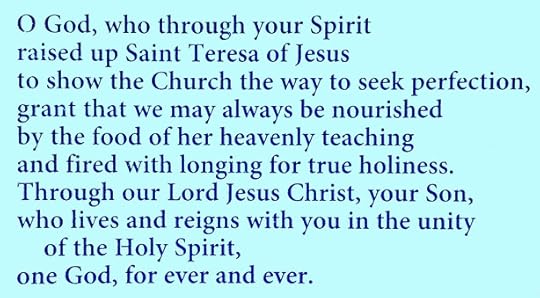John Janaro's Blog, page 112
October 25, 2020
The Art of Autumn
We have not yet had really good colors this Fall, though I'm sure the best is yet to come. Meanwhile I have taken the opportunity to "anticipate" (and, perhaps, exaggerate) some Autumn brightness with a few works of Digital Art:

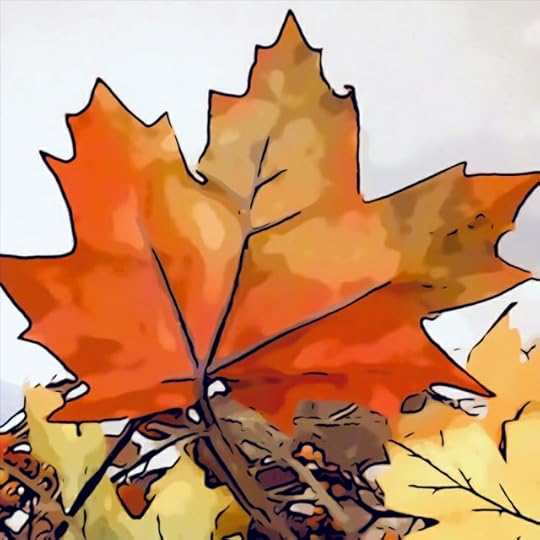
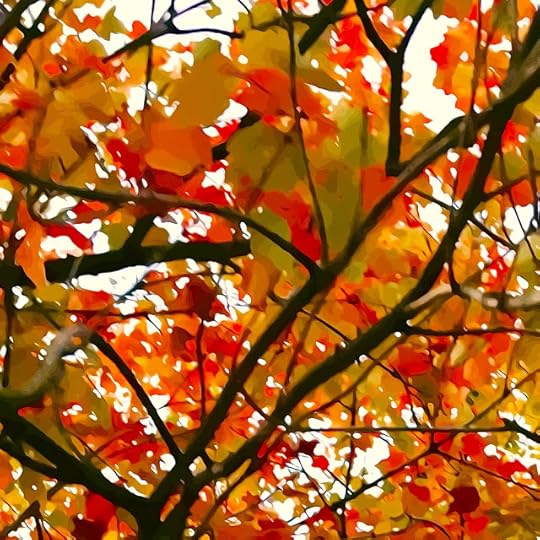
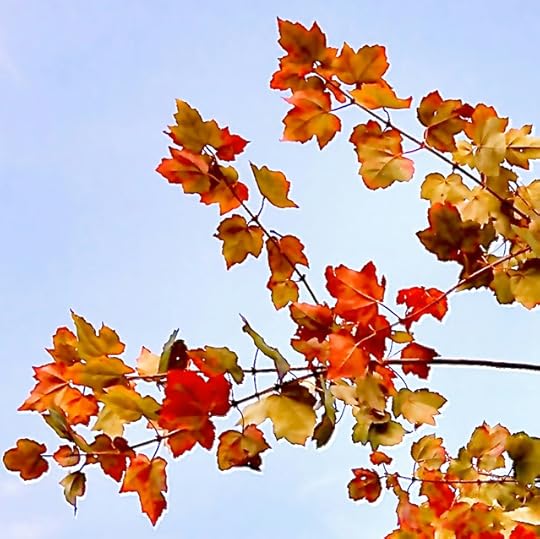
October 24, 2020
"San Lorenzo" of the Americas
On the sixth anniversary of his death (and - he would probably want me to add - his future feast day
October 23, 2020
I Unite Myself Wholly to You...
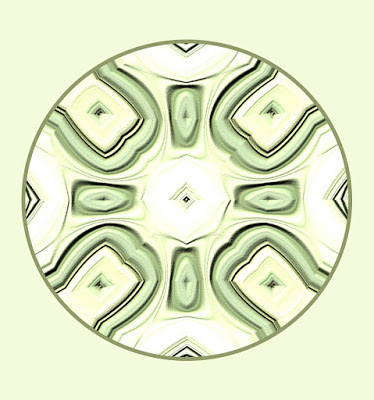 O God, I give thanks to You.
O God, I give thanks to You. How amazing is the design of Your wisdom for the human race. You have willed to manifest and glorify the Mystery of who You are by pouring Yourself out and becoming one of us. You dwell among us and give Yourself up entirely for each and all of us.
You reveal that the Absolute Being is Absolute Love, and You offer that Love to each of us. In your wisdom you shape the hearts of each of us, fashioning us to be Your companions, making us capable of giving and receiving love and then placing Yourself in the midst of us so that we might love You and be loved by You and be transformed into Your likeness.
O Jesus help me.All I can do is offer everything to You.
You have created me for Yourself.
My heart desires You,
and yet how often do I even think of what I do?
I am resolved to do the best I can.
I am resolved to seek Your will and to do Your will,
because Your will is Love,
and it will always be what will enlarge my soul,
and make me truly free,
because I am made for Love.
I have been entrusted to Your Love,ever since the day when You claimed me as Your own;in spoken word and water and the Spirit,I was born anew,a child of the Father, inserted into the history of Love's ultimate gift,anointed as a witness to hope.
I encounter You in worship,in the precious faces of my brothers and sisterswho walk with me on this journey toward You,in the welcoming words of Your forgiveness,and especially in the Bread of Life given each day,You, body and blood, salvation, become our food.
Jesus, I need You.Come and nourish me, be my sustenance.I embrace You and I unite myself wholly to You,with my small love and all my incoherence, my wounds, my fears, my hesitations, my need for healing,but also with all my confidence in Your presence and Your Love.
Never permit me to be separated from You.
I abandon myself completely to You,
and to Your plan for my life.
I know there is weakness and resistance in me
that I do not know how to overcome.
I know there are ways I must grow that I do not understand.
I know that my life is a mystery hidden in Your wisdom and goodness.
O Jesus, I offer everything to You.
Convert me.
Change me.
Open my heart to the Love You give me in this moment.
Carry my soul.
Give me, in Your Infinite Mercy, the willing heart
that loves You in the way You long for me to love You.
I am hindered from the freedom for which I have been made,
the freedom to live as the image and grow as the likeness of God.
And so I abandon myself entirely to Your Mercy.
For You have loved me first,
so that - by the power of Your Love - I might love You
and receive You in giving myself to You.
Jesus, I trust in You.
October 22, 2020
Saint John Paul II Rescued Us When We Were Drowning
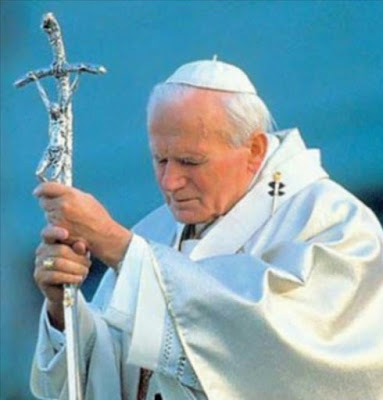 I belong to the generation that spanned the entire pontificate of the man we now know as Saint John Paul II. Even now, I speak about "Pope Benedict" and "Pope Francis," but when I say
the
Pope
I mean John Paul II.
I belong to the generation that spanned the entire pontificate of the man we now know as Saint John Paul II. Even now, I speak about "Pope Benedict" and "Pope Francis," but when I say
the
Pope
I mean John Paul II.In fact, for our generation he was always more than "just a Pope." Through him, Jesus grabbed hold of our minds and hearts. We went from being confused and weak to being renewed with an intense and vital faith. John Paul II evangelized and catechized us. He showed us the face of Jesus.
It was a face we desperately needed to see.
Growing up in the 1970s was very difficult, and few of us came through unscathed. We were the children of the 60s, of all the upheaval and reevaluation that opened up in those times as the last rotting support beams of what had once been the edifice of the "modern world" gave way in dramatic fashion.
And when those last walls fell we found ourselves surrounded by fascinating and terrifying instruments for exercising power over the material world -- power to communicate and learn, to build and heal in remarkable ways, power to move from one place to another, power to manipulate our own bodies, power to shape our imaginations and those of others and to foster great illusions, power to expand our horizons and also to widen vastly the scope of self-indulgence and self-deception, power that opened up whole new categories of subtle psychological and emotional manipulation and violence, power for greater empathy and solidarity with others and also to destroy ourselves, one another, and our environment. All of this power was within the reach of our emerging personalities and freedom... a freedom that shivered in the winds of this strange new world, seemingly boundless but with no sense of direction, no idea which way to move or where to go.
So we experimented. We played with these powers like toys. We found good things and had beautiful experiences. We also did violence to ourselves and to one another; even as we worried about unspeakable weapons of mass destruction, we committed innumerable atrocities on a smaller scale, leaving a wreckage of interpersonal relationships that so many of us are still not ready to face.
Catholic Christians in the developed world in the 70s faced the same disorientation as the wider culture. The Church in the time of Saint Paul VI was heroic, but she was enduring a kind of martyrdom. Hers was a mysterious and hidden witness (for those of us who lacked the faith to perceive it at the time). It was a seed plunging deep into the earth, destined to bear tremendous fruit, but at that time far below the horizon of those of us who were thrown into the wild, primal seas of the new culture of power. We were desperate for a way to survive.
The amazing new world of possibilities and urges and speed and images was like a great flood. We couldn't direct it. We hardly knew what to do as it engulfed us. We had become lightheaded and out of focus, choking beneath the waves, dizzy from the lack of oxygen.
I can't adequately express what John Paul II did not only for me but for our entire generation.
People have to understand: we were drowning, DROWNING , and he rescued u s.
He showed us that we were human beings, and that following Jesus was the way to find our true selves. He held up to our gaze the image of Christ, the greatness of Christ. He convinced us that Christ could give meaning to our lives, that Christ was stronger than all the forces raging around us and within us.
With Christ, we could find the way to live in the midst of the flood, and even to walk on the water.
The Lord used Saint John Paul II to rescue us from a deluge that was carrying away our sense of identity, our human dignity, our confidence in God. He showed us anew the face of Jesus, and proclaimed that Jesus was more than adequate to the upheaval of the times. John Paul II convinced us - by the depth of his teaching and by the witness of his own transformed humanity - that we didn't need to be afraid. That is why my generation loves him so much, and why we will never forget him.
October 21, 2020
若望 強 看守者 "The Rectification of Names" (sort of...?)
 ."The Rectification of Names" (sort of...?)
."The Rectification of Names" (sort of...?)若望 (John, my proper name in Chinese)
強 (the term "Qiang" means "strong," sounds like "John")
看守者 (the term "Kanshouzhe" means "watchman" - ["Janaro" = "door guard"] )
My Chinese name is "Watchman Strong" (with surname first), but it sounds better to take the shorter term for a surname, result in this name:
強 看守者 (Qiang Kanshouzhe)
Add my Christian name at the beginning and I am "John Qiang Kanshouzhe," 若望 強 看守者 ... I don't know if any of this is correct!
若望 強 看守者 "John Qiang Kanshouzhe" (pronounced "Chong Kan-show-je," or something like that?)
----------------------------------------
So what is the point of all of this linguistic speculation? Not much. One way to begin to understand a language (not just to "translate" but try to perceive its inner genius) is to "play around with it." In relation to the Chinese language, I have the aptitude of a baby. Indeed, I'm a baby who is curious and reckless and who has some very powerful toys.
In the global village, many of us are "babies" in more ways than we know. We are playing around with world, and it would be helpful if there were more "adults" here to guide us and keep us out of trouble. As I've noted before, the "global village" is not a quaint metaphor. It's a kind of paradox with its "enormous proximity." It's a dangerous place, where we must be very careful before we pick quarrels.
This year we have learned that it doesn't take much to paralyze the village. I hope we don't need to be reminded that it would be very easy to burn the whole thing down.
But... getting back to Chinese...
I am aware of the irony of playing around with one of history's oldest languages. But the Internet serves up characters, pronunciation, even images of calligraphy (that's my "name" in Chinese script at the top). I have titled this post (ironically) with an invocation of one of the basic concerns of Confucius: the need to call things by their right names.
In a global multimedia "conversation," this is a great challenge. Imagery is more than ever a "language" of its own: easily manipulated, but also possessed of the capacity to cut through elaborate and entrenched rationalizations and recall human beings to basic truths, and perhaps even present new things.
We must learn to use the language of multimedia wisely. Perhaps the Chinese have something to teach us, with their highly refined pictographic literature. Here, I have tossed around word-characters fed to me by AI translation technology. I was told that 強 means "strong" but I was not told why. Written Chinese is not a language of abstract signs, rules, and grammatical constructions. It is a language of illustrations, that conveys levels of meaning, metaphors, and beauty in a different way.
The illustrations are stylized from centuries of use, but mastering the styles permits one not only to understand but also "to see" basic images associated with the concepts, drawn (at least remotely) from the experience of reality.
As we become less literate in the West (and we are becoming poorer readers and writers, even as we are surrounded by phonetic words), we also are adopting elements of (a still very primitive) pictoral writing. The emoji (
October 20, 2020
Thirty Years Ago: From Bitterness to Joy
I have been looking back at the (handwritten) journal I was keeping 30 years ago.
It was sort of a "proto-Blog," even though I couldn't have imagined in those days anything like what we can do now with blogs. It was my "writing workshop," I suppose, but I knew that no one else was reading it. Well... at least not yet! Given that I was planning on (dreaming about) becoming a Great Man "in the future" - this was half my lifetime ago - I probably had at least a subconscious expection that this journal would be of interest "to posterity."
And it seems that my pompous subconscious was right, in a way: "posterity" is interested, and is reading the never-really-meant-to-be-private journals. Here I am, my posterior self, thirty years later (and "here you are," if you're reading this now). Anyway, here is a page that represents what I'm finding in the old journal, at the end of the month of October in the year One Thousand Nine Hundred and Ninety (yes, that's 1990):

Television was "raising the kids" in 1990. The Box was indeed at its height. Cable was booming with new networks, and everyone had VCRs and at least one membership card to a video rental store. Of course, by 1990 we also had personal computers in our homes. They were planted on desks, and looked like bulky microwave ovens. They were useful for documents and data, but they weren't much fun. In those days, the television and the computer occupied two entirely separate worlds, and there was no reason to imagine that that would ever change. As for phones... well, they were your house, securely plugged into the wall.
TV was king. In a few months, Americans would get to watch their first "live war." Thanks to CNN, the bombing of Baghdad was brought into our living rooms like a football game. They even designed a eye-catching logo for "the Gulf War." TV was shaping all of us. It was defining the stories with its images. Upstart cable stations and poor quality homemade video tapes hinted at the possibility of "new media," but not much....
What about John Janaro in 1990? I was doing well in graduate school. "But I am not happy. I am not content. I am not satisfied." I was 27 and I thought that "all things [were] bitter on the tongue."
For all that has happened in the past thirty years — even with the ironic realization that the brilliant and promising future that stretched before me in 1990 ended up being the academic-and-human-trainwreck that happened to me (and that continues) in 2020 — still, I would not describe my life today as "bitter on the tongue." No. Not at all!
It is a great life.
Things are not bitter. Arduous and difficult, yes. But not bitter. It is a great thing to be alive, and to have hope for each day. At the root of me, beneath whatever complaints, frustrations, problems and pains, there is gratitude.
It is not some facile emotion. It is a stubborn disposition, and it's not something I feel like I can "take credit for" (if anything, it has grown in spite of my impatience and petulance). I am grateful for this gratitude, this joy. I could make a long list of what I'm grateful for, but it would only scratch the surface of something about my life that I don't really understand (and that I can't take for granted, but must recall myself to it as best as I can, I must live it, I want to live it).
I think it has to do with a deeper awareness of "belonging" to the ultimate Mystery, and a stronger conviction that this Mystery is a Someone who loves me. I can rediscover gratitude and joy, rediscover my true self, when I remember that I have a loving Father, and that I am his child, and that the long journey of this life is leading me home.
Perhaps in some ways I've grown younger with the passing of years.
October 19, 2020
In Memory of a Friend
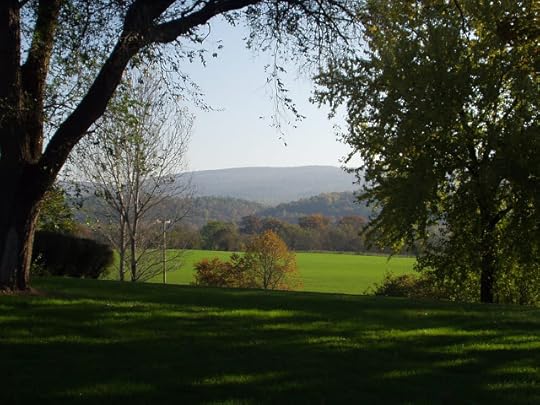
In Memory of a Friend
"He didn't seem like he was depressed and was always smiling. This is shocking" (Anon).
I stood strong and tallin the breezy windand felt life once againlike great powerfrom my head flowing down through me.
With large stridesI passed over the fieldsdrinking fountains of expansive air.
And with the red sun playing on my head,I burst through the doorbut her face was bloodless white.I stopped, and suddenlythe October air froze on my skin.
She searched my facewith a gaze of shiny wet cheeksand spoke your name,and this single wordhad a weightthat said everything.
Sparks of fire enkindled my bones,spreading all over and through me,with warm rivers flowing out from my eyes.
And the sun flickered in the shadows.
--in memoriam, jp, +october 17, 2005
October 17, 2020
The Strange New Joy of Ignatius of Antioch
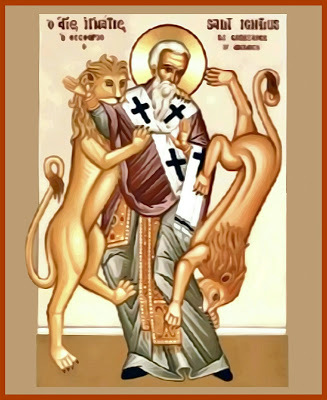 We have all heard about the early Christians who were persecuted by being "thrown to the lions" during the games in Imperial Rome. It may seem like a cliché to us so many centuries later.
We have all heard about the early Christians who were persecuted by being "thrown to the lions" during the games in Imperial Rome. It may seem like a cliché to us so many centuries later. The second century texts of Saint Ignatius of Antioch, however, speak about this tortuous and humiliating death with strange eloquence, long before anyone in the world had imagined that such a terrible fate could be embraced with heroism, much less longed-for as the crown of life. Yet as his condemnation drew closer, Ignatius wrote letters to the churches in Asia Minor and to Rome where he was destined to meet his earthly end.
Before the year 110, he wrote about this "new thing" called martyrdom in astonishing terms. What gave a human being the audacity to say that when he was killed and shamed by those who hated him - when his body was torn apart by lions - "then, I shall become a man"...?
Something new had happened in the world: Jesus Christ had died on the cross, and was risen.
Death had been overcome. And in these days so soon after the era of the New Testament, Ignatius was vividly aware that this victory over death revealed the meaning of life. We have been made in God's image and destined to his glory through Jesus, the Father's Son, who took flesh in the womb of a virgin and made his dwelling with us.
Ignatius bore witness to these very specific events as the central events of history, "mysteries...wrought in the stillness of God": Mary's virginity, Jesus's birth, his saving death... actual events that happened to a real man only very recently, and known only to a few people on the face of the earth. Ignatius bore witness in his final days, as a man condemned to death, that all of it happened, that it was all true, that it changed everything.
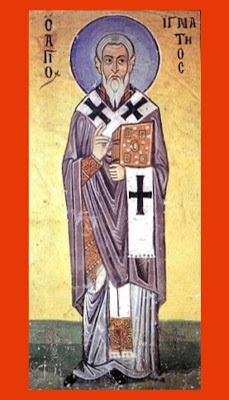 Thus, he could exhort Christians then and now to rejoice in God and share this new life with all the world: "
Y
ou all are fellow travelers, God-bearers and temple-bearers, Christ-bearers and bearers of holiness, with the commandments of Jesus Christ for festal attire... But pray unceasingly also for the rest of men, for they offer ground for hoping that they may be converted and win their way to God. Give them an opportunity therefore, at least by your conduct, of becoming your disciples. Meet their angry outbursts with your own gentleness, their boastfulness with your humility, their revilings with your prayers, their error with your constancy in the faith, their harshness with your meekness; and beware of trying to match their example. Let us prove ourselves their brothers through courtesy
" (to Ephesians, chs 9, 10).
Thus, he could exhort Christians then and now to rejoice in God and share this new life with all the world: "
Y
ou all are fellow travelers, God-bearers and temple-bearers, Christ-bearers and bearers of holiness, with the commandments of Jesus Christ for festal attire... But pray unceasingly also for the rest of men, for they offer ground for hoping that they may be converted and win their way to God. Give them an opportunity therefore, at least by your conduct, of becoming your disciples. Meet their angry outbursts with your own gentleness, their boastfulness with your humility, their revilings with your prayers, their error with your constancy in the faith, their harshness with your meekness; and beware of trying to match their example. Let us prove ourselves their brothers through courtesy
" (to Ephesians, chs 9, 10).This love - bearing witness to the redeeming love of Jesus on the cross - changes life and changes death. The ardent metaphors of Ignatius of Antioch in the face of martyrdom express this love:
"Allow me to be eaten by the beasts, which are my way of reaching to God. I am God’s wheat, and I am to be ground by the teeth of wild beasts, so that I may become the pure bread of Christ" (to Romans).
The same spirit, the same willingness, the same love endures today. For two thousand years, people have given their lives: people from all over the earth, from every historical period, from the multitude of nations, the most diverse ethnic groups and cultures, men and women, young and old, from every occupation, every social class. They have given their lives, totally, willingly, passionately, with immense love, not for an ideology or a worldview or an emotional sentiment, but for a man ...
Jesus Christ.
There is nothing in all of history that compares to this testimony of so many, through the ages - all the devotion and human vitality of witnesses who gave freely and are still remembered and celebrated to this day - all for the love of this man, Jesus Christ.
This man, our brother, is God-with-us.
So we have reason to rejoice, to share that joy, and to love everyone in the hope that they too will find this joy, that they will find God who loves them, for whom they have been made.
October 16, 2020
Reality is an Event That Proceeds From An OTHER
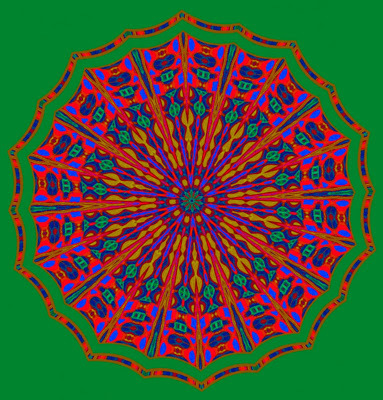 Some texts from Msgr Giussani in our recent reading:
Some texts from Msgr Giussani in our recent reading:"Recognizing reality as deriving from the mystery should be familiar to reason, because precisely in recognizing what is real, just as it is, as God wanted it to be, rather than reduced, flattened out, without depth, we find a correspondence with the needs of our heart, and our innate capacity for reason and affectivity is fully realized.
"For reason, owing to its own very original dynamic, cannot fulfill itself unless it recognizes that reality is rooted in mystery. Human reason reaches its apex, and so is truly reason, when it recognizes things for what they are, and things as they proceed from an Other."
In fact, this proceeding-from-an-Other means that everything that exists is constituted as an event. "The dynamic of event describes every instant of life: the flower in the field ‘which the Father clothes better than Solomon’ is an event; the ‘bird that falls’ and the heavenly Father knows it, ‘is an event;’ ‘the hairs on your head are numbered’ - they are an event.
"Even heaven and earth, which have existed for a million centuries, are an event: an event that still occurs as something new, since their explanation is inexhaustible. To glimpse something greater in the relationship with everything means that the relationship itself is event.”
~Luigi Giussani
October 15, 2020
Teresa of Avila: "Fulfill God's Will in Us"

"We can only learn to know ourselves and do what we can: namely, surrender our will and fulfill God's will in us" (Saint Teresa of Avila).
Here is today's "Collect Prayer" for Teresa's feast day:
